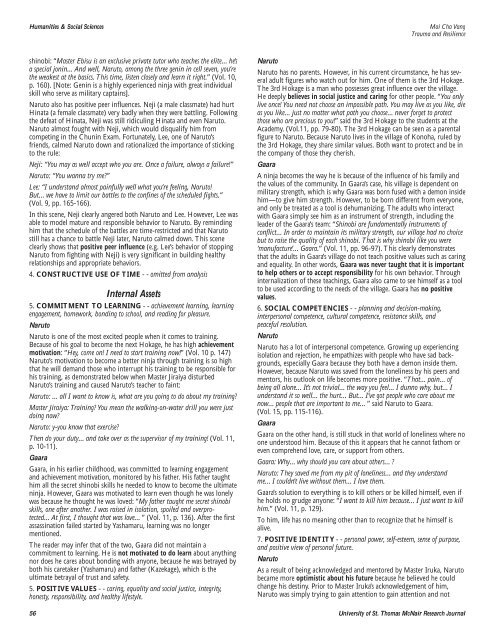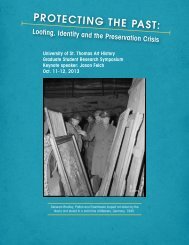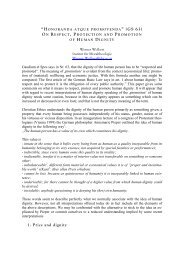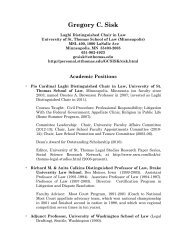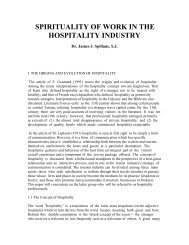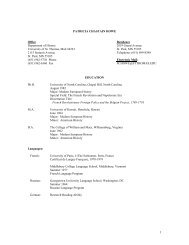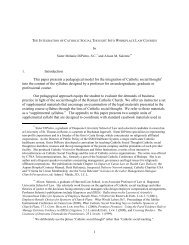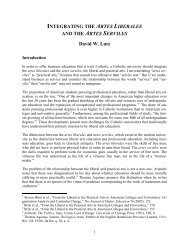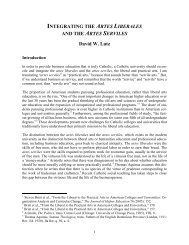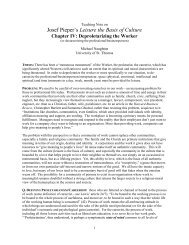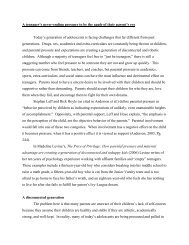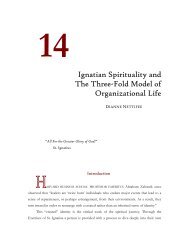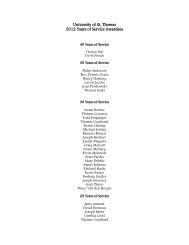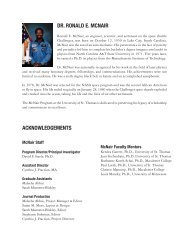McNair Research Journal - University of St. Thomas
McNair Research Journal - University of St. Thomas
McNair Research Journal - University of St. Thomas
You also want an ePaper? Increase the reach of your titles
YUMPU automatically turns print PDFs into web optimized ePapers that Google loves.
Humanities & Social Sciences<br />
shinobi: “Master Ebisu is an exclusive private tutor who teaches the elite…he’s<br />
a special jonin…And well, Naruto, among the three genin in cell seven, you’re<br />
the weakest at the basics. This time, listen closely and learn it right.” (Vol. 10,<br />
p. 160). [Note: Genin is a highly experienced ninja with great individual<br />
skill who serve as military captains].<br />
Naruto also has positive peer influences. Neji (a male classmate) had hurt<br />
Hinata (a female classmate) very badly when they were battling. Following<br />
the defeat <strong>of</strong> Hinata, Neji was still ridiculing Hinata and even Naruto.<br />
Naruto almost fought with Neji, which would disqualify him from<br />
competing in the Chunin Exam. Fortunately, Lee, one <strong>of</strong> Naruto’s<br />
friends, calmed Naruto down and rationalized the importance <strong>of</strong> sticking<br />
to the rule:<br />
Neji: “You may as well accept who you are. Once a failure, always a failure!”<br />
Naruto: “You wanna try me?”<br />
Lee: “I understand almost painfully well what you’re feeling, Naruto!<br />
But…we have to limit our battles to the confines <strong>of</strong> the scheduled fights.”<br />
(Vol. 9, pp. 165-166).<br />
In this scene, Neji clearly angered both Naruto and Lee. However, Lee was<br />
able to model mature and responsible behavior to Naruto. By reminding<br />
him that the schedule <strong>of</strong> the battles are time-restricted and that Naruto<br />
still has a chance to battle Neji later, Naruto calmed down. This scene<br />
clearly shows that positive peer influence (e.g. Lee’s behavior <strong>of</strong> stopping<br />
Naruto from fighting with Neji) is very significant in building healthy<br />
relationships and appropriate behaviors.<br />
4. CONSTRUCTIVE USE OF TIME - - omitted from analysis<br />
Internal Assets<br />
5. COMMITMENT TO LEARNING - - achievement learning, learning<br />
engagement, homework, bonding to school, and reading for pleasure.<br />
Naruto<br />
Naruto is one <strong>of</strong> the most excited people when it comes to training.<br />
Because <strong>of</strong> his goal to become the next Hokage, he has high achievement<br />
motivation: “Hey, come on! I need to start training now!” (Vol. 10 p. 147)<br />
Naruto’s motivation to become a better ninja through training is so high<br />
that he will demand those who interrupt his training to be responsible for<br />
his training, as demonstrated below when Master Jiraiya disturbed<br />
Naruto’s training and caused Naruto’s teacher to faint:<br />
Naruto: …all I want to know is, what are you going to do about my training?<br />
Master Jiraiya: Training? You mean the walking-on-water drill you were just<br />
doing now?<br />
Naruto: y-you know that exercise?<br />
Then do your duty…and take over as the supervisor <strong>of</strong> my training! (Vol. 11,<br />
p. 10-11).<br />
Gaara<br />
Gaara, in his earlier childhood, was committed to learning engagement<br />
and achievement motivation, monitored by his father. His father taught<br />
him all the secret shinobi skills he needed to know to become the ultimate<br />
ninja. However, Gaara was motivated to learn even though he was lonely<br />
was because he thought he was loved: “My father taught me secret shinobi<br />
skills, one after another. I was raised in isolation, spoiled and overprotected…At<br />
first, I thought that was love…” (Vol. 11, p. 136). After the first<br />
assassination failed started by Yashamaru, learning was no longer<br />
mentioned.<br />
The reader may infer that <strong>of</strong> the two, Gaara did not maintain a<br />
commitment to learning. He is not motivated to do learn about anything<br />
nor does he cares about bonding with anyone, because he was betrayed by<br />
both his caretaker (Yashamaru) and father (Kazekage), which is the<br />
ultimate betrayal <strong>of</strong> trust and safety.<br />
5. POSITIVE VALUES - - caring, equality and social justice, integrity,<br />
honesty, responsibility, and healthy lifestyle.<br />
Mai Cha Vang<br />
Trauma and Resilience<br />
Naruto<br />
Naruto has no parents. However, in his current circumstance, he has several<br />
adult figures who watch out for him. One <strong>of</strong> them is the 3rd Hokage.<br />
The 3rd Hokage is a man who possesses great influence over the village.<br />
He deeply believes in social justice and caring for other people. “You only<br />
live once! You need not choose an impossible path. You may live as you like, die<br />
as you like…just no matter what path you choose…never forget to protect<br />
those who are precious to you!” said the 3rd Hokage to the students at the<br />
Academy. (Vol.11, pp. 79-80). The 3rd Hokage can be seen as a parental<br />
figure to Naruto. Because Naruto lives in the village <strong>of</strong> Konoha, ruled by<br />
the 3rd Hokage, they share similar values. Both want to protect and be in<br />
the company <strong>of</strong> those they cherish.<br />
Gaara<br />
A ninja becomes the way he is because <strong>of</strong> the influence <strong>of</strong> his family and<br />
the values <strong>of</strong> the community. In Gaara’s case, his village is dependent on<br />
military strength, which is why Gaara was born fused with a demon inside<br />
him—to give him strength. However, to be born different from everyone,<br />
and only be treated as a tool is dehumanizing. The adults who interact<br />
with Gaara simply see him as an instrument <strong>of</strong> strength, including the<br />
leader <strong>of</strong> the Gaara’s team: “Shinobi are fundamentally instruments <strong>of</strong><br />
conflict…In order to maintain its military strength, our village had no choice<br />
but to raise the quality <strong>of</strong> each shinobi. That is why shinobi like you were<br />
‘manufacture’…Gaara.” (Vol. 11, pp. 96-97). This clearly demonstrates<br />
that the adults in Gaara’s village do not teach positive values such as caring<br />
and equality. In other words, Gaara was never taught that it is important<br />
to help others or to accept responsibility for his own behavior. Through<br />
internalization <strong>of</strong> these teachings, Gaara also came to see himself as a tool<br />
to be used according to the needs <strong>of</strong> the village. Gaara has no positive<br />
values.<br />
6. SOCIAL COMPETENCIES - - planning and decision-making,<br />
interpersonal competence, cultural competence, resistance skills, and<br />
peaceful resolution.<br />
Naruto<br />
Naruto has a lot <strong>of</strong> interpersonal competence. Growing up experiencing<br />
isolation and rejection, he empathizes with people who have sad backgrounds,<br />
especially Gaara because they both have a demon inside them.<br />
However, because Naruto was saved from the loneliness by his peers and<br />
mentors, his outlook on life becomes more positive. “That…pain…<strong>of</strong><br />
being all alone…It’s not trivial…the way you feel…I dunno why, but…I<br />
understand it so well…the hurt…But…I’ve got people who care about me<br />
now…people that are important to me…” said Naruto to Gaara.<br />
(Vol. 15, pp. 115-116).<br />
Gaara<br />
Gaara on the other hand, is still stuck in that world <strong>of</strong> loneliness where no<br />
one understood him. Because <strong>of</strong> this it appears that he cannot fathom or<br />
even comprehend love, care, or support from others.<br />
Gaara: Why…why should you care about others…?<br />
Naruto: They saved me from my pit <strong>of</strong> loneliness…and they understand<br />
me…I couldn’t live without them…I love them.<br />
Gaara’s solution to everything is to kill others or be killed himself, even if<br />
he holds no grudge anyone: “I want to kill him because…I just want to kill<br />
him.” (Vol. 11, p. 129).<br />
To him, life has no meaning other than to recognize that he himself is<br />
alive.<br />
7. POSITIVE IDENTITY - - personal power, self-esteem, sense <strong>of</strong> purpose,<br />
and positive view <strong>of</strong> personal future.<br />
Naruto<br />
As a result <strong>of</strong> being acknowledged and mentored by Master Iruka, Naruto<br />
became more optimistic about his future because he believed he could<br />
change his destiny. Prior to Master Iruka’s acknowledgement <strong>of</strong> him,<br />
Naruto was simply trying to gain attention to gain attention and not<br />
56 <strong>University</strong> <strong>of</strong> <strong>St</strong>. <strong>Thomas</strong> <strong>McNair</strong> <strong>Research</strong> <strong>Journal</strong>


